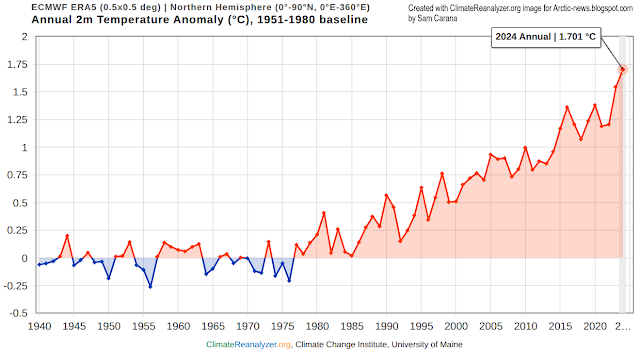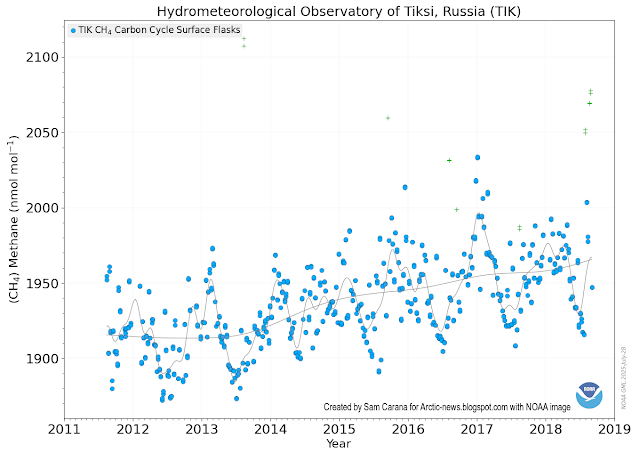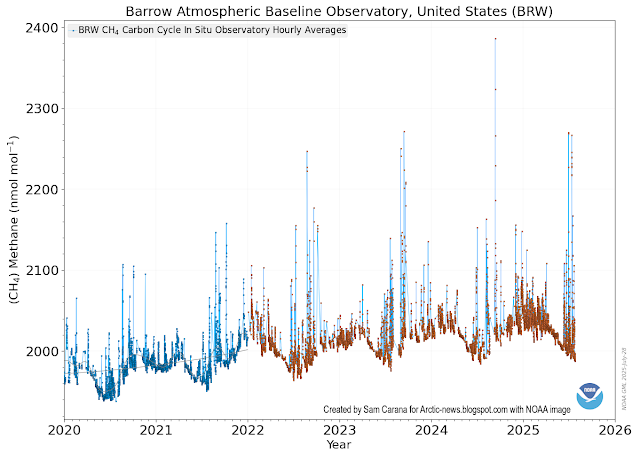Arctic sea ice extent was 8.35 million km² on July 4, 2025, a record low extent for this time of year. This record daily low extent is the more significant since it was reached in the absence of El Niño conditions. Instead, ENSO-neutral and borderline La Niña conditions are currently dominant.
Sea ice extent is one out of several measurements indicating the miserable state the Arctic sea ice is in, as also discussed in an earlier post. The image below shows Arctic sea ice concentration on July 31, 2025.
Sea ice extent is one out of several measurements indicating the miserable state the Arctic sea ice is in, as also discussed in an earlier post. The image below shows Arctic sea ice concentration on July 31, 2025.
The combination image below shows Arctic sea ice thickness on July 12, 2025 (left) and a sea surface temperature of 10.3°C or 50.6°F on July 10, 2025 (at the green circle, center), corresponding with a sea surface temperature anomaly of 11.4°C or 20.5°F on July 5, 2025 (at the green circle, right).
The combination below shows the Northern Hemisphere on July 27, 2025. Globe on the left: sea surface temperature anomalies. Globe at the center: sea surface temperatures. Globe on the right: the Jet Stream (at 250 hPa) lines up with the Gulf Stream on its way toward the Arctic Ocean.
Arctic sea ice volume was at a record daily low on July 30, 2025, as it has been for more than a year, as illustrated by the image below.
Antarctic sea ice area fell from 11.72 million km² (17th place) on July 6, 2025, to 11.30 million km² (2nd place) on July 15, 2025, as illustrated by the image below.
Global sea ice extent was 21.99 million km² on July 18, 2025, a standard deviation of -5.06σ from 1981-2010, as illustrated by the image below.
This very low global sea ice extent means loss of albedo, as a lot less sunlight now gets reflected back into space by global sea ice and instead gets absorbed by the sea surface. Low sea ice extent thus is a self-amplifying feedback loop that further drives up global temperatures, and this in turn threatens to strengthen numerous further self-amplifying feedback loops such as changes to ocean currents that cause more heat to accumulate at the ocean surface and darkening of the ocean surface, which further reduces the Earth's albedo, as warned about in a recent study led by Thomas Davies.
Will an Arctic Blue Ocean Event occur in 2025?
 |
| [ from earlier post ] |
Most climate models do not anticipate an Arctic Blue Ocean Event (BOE) to occur soon. For such a BOE to occur in 2025 would therefore count as a Black Swan event, i.e. something unexpected. Having said that, there are many things that most climate models didn't expect to occur, including:
Extreme heat stress warning
- Very high temperatures, starting in 2023 and still persisting this year
- Very low Antarctic sea ice over the pasty few years
- Record high concentrations of greenhouse gases
- Heat rising from the Southern Ocean into the atmosphere, as discussed in an earlier post
- Record low Earth's albedo (as illustrated by the image below)
 |
| [ Earth's albedo, image from Eliot Jacobson, also discussed on facebook ] |
The image on the right, from an earlier post, shows inferred contributions to this drop in albedo, by Hansen et al.
There is a compound impact in that sea ice loss comes with albedo loss that causes more heat to be absorbed by oceans, while higher global sea surface temperatures also cause further loss of lower clouds, further reducing albedo and thus accelerating the temperature rise.
There is a compound impact in that sea ice loss comes with albedo loss that causes more heat to be absorbed by oceans, while higher global sea surface temperatures also cause further loss of lower clouds, further reducing albedo and thus accelerating the temperature rise.
Polar amplification of the temperature rise narrows the temperature difference between the poles and the Equator, which causes distortion of the Jet Stream that in turn results in more extreme weather events. A 2025 study led by Tselioudis suggests that this causes the band of clouds over the Tropics to contract. Since clouds over the Tropics reflect relatively more sunlight, this results in reduced global albedo.
The extraordinary albedo loss depicted in the above image causes the temperature to rise, increasing the probability for a Blue Ocean Event to occur in the course of 2025.
The extraordinary albedo loss depicted in the above image causes the temperature to rise, increasing the probability for a Blue Ocean Event to occur in the course of 2025.
2024 temperature anomaly in the Northern Hemisphere: an 14.349σ event
Talking about probabilities, the 2024 world 2m temperature standard deviation from 1951-1980 was very high, an anomaly of 11.157 σ, as illustrated by the image below.
In statistics, the empirical rule states that in a normal distribution, 68% of the observed data will occur within one standard deviation (1σ), 95% within two standard deviations (2σ), and 99.7% within three standard deviations (3σ) of the mean. A 4σ event indicates that the observed result is 4 standard deviations (4σ) away from the expected mean. In a normal distribution, 99.993666% of data points would fall within this range. The chance for data to fall outside of 4σ is thus infinitesimally small. The 2024 world temperature anomaly was an 11.157σ event.
In the Northern Hemisphere, the 2024 temperature anomaly was 1.701°C higher than the 1951-1980 mean, as illustrated by the above image. This constitutes a 14.349σ event, as illustrated by the image below.
The 2024 temperature anomaly in the Northern Hemisphere was much higher than the world 2024 temperature anomaly, as illustrated by the above images. The difference between the land and ocean anomalies is even larger, the 2024 temperature anomaly on land was 1.9°C, while the ocean anomaly was 0.92°C, as illustrated by the image below.
Temperature anomaly peaks in specific areas can be much higher than global annual averages. As an example, temperature anomalies for February 2024 were 15-20°C higher than 1951-1980 in some areas, as illustrated by the map on the right.
Note also that 1951-1980 is a relatively recent period; when compared with a genuinely pre-industrial base, temperature anomalies will be even higher.
In conclusion, to call the 2024 temperature anomaly on land in the Northern Hemisphere extraordinary is an understatement. There is an unacceptable danger that the temperature rise will accelerate further, hitting areas on land in the Northern Hemisphere hard, which is where after all most people live.
Danger Assessment
 |
| [ image from earlier post ] |
The very continuation of life on Earth is at stake and the sheer potential that all life on Earth may be condemned to disappear due to a refusal by some people to do the right thing, that should prompt the whole world into rapid and dramatic climate action.
Seafloor methane
As the temperature of the water of the Arctic Ocean rises, more ocean heat can penetrate sediments at the seafloor of the Arctic Ocean, which can destabilize methane hydrates contained in these sediments and cause eruptions of huge amounts of methane from the hydrates and from free gas kept underneath these hydrates.
The image below shows that methane concentrations as high as 2525 parts per billion (ppb) were recorded at a pressure level of 399.1 mb by the NOAA 20 satellite on July 19, 2025 AM. High concentrations of methane show up over the Beaufort Sea and over the East Siberian Arctic Shelf (ESAS). Also note the higher concentrations of methane that are showing up around Antarctica.
The image below shows that methane concentrations as high as 2525 parts per billion (ppb) were recorded at a pressure level of 399.1 mb by the NOAA 20 satellite on July 19, 2025 AM. High concentrations of methane show up over the Beaufort Sea and over the East Siberian Arctic Shelf (ESAS). Also note the higher concentrations of methane that are showing up around Antarctica.
The image below shows the situation at a pressure level of 1000 MB (corresponding to an altitude close to the surface). The image shows that most of the highest concentrations of methane (magenta color) are coming from the oceans at the Northern Hemisphere polar and temperate zones (higher than latitude 23.5°N). No data are available for the white areas (tracks missed by satellite) and grey areas (quality control failure).
There are only a few locations where methane data are collected, from flasks and instruments in stations. Data from Tiksi in Siberia have stopped years ago, as illustrated by the image below.
Data are available from the Barrow Atmospheric Baseline Observatory (BRW), a NOAA facility located near Utqiaġvik (formerly Barrow), Alaska, at 71.32 degrees North, as illustrated by the image below.
Extreme heat stress warning
The image below highlights an extreme heat stress warning for Memphis, Tennessee, for July 22, 2025.
The image below shows a forecast for July 22, 2025, by Climate Reanalyzer.
The image below shows an extreme heat stress warning for July 22, 2025, for locations in Tennessee.
Climate Emergency Declaration
The situation is dire and the precautionary principle calls for rapid, comprehensive and effective action to reduce the damage and to improve the situation, as described in this 2022 post, where needed in combination with a Climate Emergency Declaration, as discussed at this group.
Links
• National Institute of Polar Research Japan
https://ads.nipr.ac.jp
• Darkening of the Global Ocean - by Thomas Davis et al. (2025)
https://ads.nipr.ac.jp
• Nullschool.net
• University of Bremen
• Kevin Pluck - sea ice visuals
• Darkening of the Global Ocean - by Thomas Davis et al. (2025)
discussed on Facebook at:
https://www.facebook.com/groups/arcticnews/posts/10162720612504679
• Climate Reanalyzer
• Heads in the clouds while Earth is burning
• Saltier water, less sea ice
• Arctic Blue Ocean Event 2025? (update June 2025)
• NOAA - satellite methane measurements
• NOAA - flask and station methane measurements
• NASA - GISS Surface Temperature Analysis
• National Weather Service - National Digital Forecast Database
• NOAA - heat risk graphics
• Transforming Society
https://arctic-news.blogspot.com/2022/10/transforming-society.html
• Climate Plan
https://arctic-news.blogspot.com/p/climateplan.html
• Climate Emergency Declaration
https://arctic-news.blogspot.com/p/climate-emergency-declaration.html
https://arctic-news.blogspot.com/2022/10/transforming-society.html
• Climate Plan
https://arctic-news.blogspot.com/p/climateplan.html
• Climate Emergency Declaration
https://arctic-news.blogspot.com/p/climate-emergency-declaration.html




















